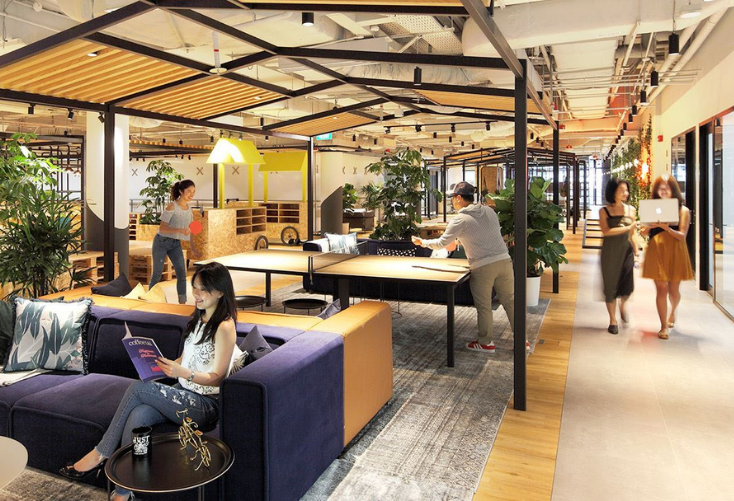Hand selected flexible workspace news from the most reliable sources to keep you ahead of the pack. We find all the latest news, so you don’t have to. Morning and afternoon updates. Stay in the know.
Here’s what you need to know today:
- Hong Kong Developers To Delve In The Coworking Industry NEW
- Coworking Providers Are Still Optimistic About The Future NEW
- How The Hybrid Approach Will Change Office Design NEW
- Remote Working Will Remain A Mainstay
- Remote Working Could Help Coffee Shops Grow
- Proptech’s Role In The Future Of The Workplace
Hong Kong Developers To Delve In The Coworking Industry
Demand for traditional offices is falling, so leading developers in Hong Kong are preparing for expansion of the coworking industry.
“The serviced offices sector continues to evolve as landlords are now entering the market in direct competition with established players,” said Keith Hemshall, Cushman & Wakefield’s executive director and head of office services in Hong Kong.
According to Knight Frank, operators in Hong Kong fell from 15 in mid-2018 to 13 today, while the number of locations itself has also fallen from 2018.
WeWork is one of the contributors to this decrease of space after it surrendered locations in the Harbour City Complex in Tsim Sha Tsui, Hysan Place in Causeway Bay and Hopewell Centre in Wan Chai.
Now, major companies are rethinking the way they use their space and the best ways to cut down on costs. This has led many to adopt a “core-and-flex” strategy that would allow core teams to work in offices in Hong Kong’s main district, while others work in flexible workspaces.
Eaton Club opened its four coworking spaces this year to accommodate growing demand from companies who are looking to downsize their real estate footprint or opt for a more flexible work model.
Landlords are also looking to delve into the coworking industry by opening their own spaces within their buildings in order to meet this demand.

Coworking Providers Are Still Optimistic About The Future
A new report from flexible office search platform Upsuite has found that the U.S. and Canada lost 6% of their coworking spaces this year.
Of the 4,000 locations that Upsuite tracked in North America, 226 closed in the last year with Kansas City and Portland being hit the hardest.
While this may seem like a bad omen for what is to come of the coworking industry, Upsuite CEO Ben Wright says these numbers are still lower than other sectors hit hard by the pandemic, such as retail and hospitality.
“The operators see a light at the end of the tunnel,” said Wright. “They feel like if they can make it through this time, they’ll be really well-positioned post-pandemic.”
Urban areas experienced the bulk of closures, with operators that focused on suburban markets being much better off.
The slowdown of the industry actually began pre-pandemic around this time last year. Since then, operators have had massive layoffs, faced numerous lawsuits over unpaid rent and saw high vacancy rates.
However, a recent survey from Workthere finds that coworking providers are still optimistic about the future of the industry.
Even more, a report from Colliers anticipates that flexible workspaces could double or triple in the U.S. over the next five years as companies look for offices on a short-term basis.

How The Hybrid Approach Will Change Office Design
As time goes on, it appears that more and more major corporations are embracing the idea of a more flexible workforce.
Just this week, Google informed employees that they will extend their remote working policies until September of 2021. When they do return to the office, the company will experiment with a flexible workweek that allows employees to work from home for part of the week, and come into the office other days.
Google is one of many companies who are shifting to a hybrid arrangement. Dropbox and Nationwide are also preparing to adopt a hybrid setup that is expected to transform the way their offices look.
“They’re going to be doing some of their focus work at home,” said Janet Pogue McLaurin, head of global workplace research at architecture firm Gensler. “And they’re going to be coming into the office to do more of that group work to meet with their teams and connect with each other.”
Office design will never be the same. Instead, Flex Strategy Group founder Cali Williams Yost predicts that “hotel desks” will take over stationary work stations, where employees book their space in advance and clean it off for the next person to use.

Remote Working Will Remain A Mainstay
According to Upwork’s “Future of Workforce Pulse Report,” 36.2 million Americans are anticipated to be working remotely by 2025.
The analysis has revealed that the pandemic is having a lasting impact on how businesses operate, as well as the way hiring managers view their organization.
“As businesses adapt and learn from this remote work experiment, many are altering their long-term plans to accommodate this way of working,” said Adam Ozimek, chief economist at Upwork. “What’s interesting is that remote work is getting better for the vast majority of companies as they adapt to the new model. Only 5% of respondents of the survey said it was getting worse.”
Remote working has quickly become a mainstay for many companies, with 41.8% of American workers remaining in this position at the moment.
Additionally, managers said they believe that 26.7% of the workforce will continue to operate completely remotely in one year. This indicates that some employees will return to the office, but a distributed workforce will still play a significant role in the future.
Remote working has also become easier to manage, with 68% of hiring managers saying that this arrangement is going more smoothly now than at the beginning of the pandemic.
Not only has working remotely been a necessity for companies trying to operate safely throughout the last nine months, over half of respondents said that a reduction in non-essential meetings, increased schedule flexibility and lack of commute have helped boost productivity.

Remote Working Could Help Coffee Shops Grow
Working from home was once a rare perk only a small portion of the American workforce had access to, but the pandemic has allowed nearly half of workers across the country to experience the benefits of this arrangement.
Major technology firms, such as Twitter, have already made the commitment to allowing their employees to work remotely permanently. Others have extended their remote work policies until mid to late 2021.
While the tone towards remote working has undoubtedly changed in the last nine months, some workers have expressed missing socialization with colleagues and stress caused by a lack of sufficient home office space.
Younger workers are disproportionately impacted by this, especially those who are still relatively new to the workforce. Many have migrated to new cities in hopes of meeting new people, but any are stuck in small apartments working for several hours each day.
Prior to the pandemic, coffee shops were an alternative workplace solution for professionals and students alike.
Looking forward, a door of opportunities could open for coffee shops who want to accommodate young professionals eager to get work done outside of their homes.
Coffee chains should tap into this demand by expanding their stores in larger cities to create more space for workers.
Additionally, installing glass offices so small groups of people can work together could be a great alternative for those who don’t have space at home for in-person collaboration.
Also consider investing in office tools that can help with remote working, such as computer monitors, cameras for video conferencing, television screens for presentations and more.

Proptech’s Role In The Future Of The Workplace
Proptech has emerged as one of the biggest contributors to real estate’s digital transformation. This technology has completely altered the way properties are built, managed and used.
For instance, JustCo recently launched its “Digital innovations for the future of work” platform at The Centrepoint in Singapore that stretches across three leels of the shopping mall.
The workspace features smart technology, like facial recognition to grant access to those wearing face masks, Bluetooth-enabled door entry and an in-house cafe powered by artificial intelligence.
With companies looking for more flexibility, JustCo has partnered with on-demand platform Switch to offer members easy access to their workspaces, and technology firm SixSense in order to monitor occupancy levels to maintain distancing measures.
Switch uses an app that allows professionals to browse available workspaces, grant them access and only let them pay for what they use. Currently, Switch is offered at 12 JustCo locations, as well as nine shopping mall locations.
SixSense relies on artificial intelligence to manage space usage, while providing JustCo with data to keep occupancy low and avoid overcrowding.
Using the data gathered from SixSense, JustCo is able to reconfigure the layout and design of their workspaces to create the ideal environment for all members.
Proptech will be crucial for the workspaces of tomorrow, particularly a post-pandemic future. Businesses and professionals alike are able to cut down on costs and boost their efficiency when using these shared offices, while also keeping themselves safe and healthy.


















